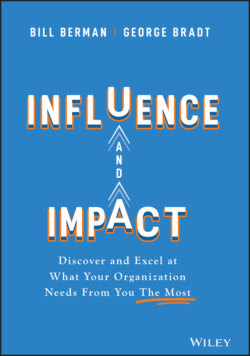Читать книгу Influence and Impact - George B. Bradt - Страница 16
Doing What Is Familiar
ОглавлениеSome people we have worked with struggled because they were uncomfortable with the responsibilities of their new job. Often, when someone is promoted, they do not immediately understand what the expectations are. Moreover, the new job frequently requires knowledge and skills that weren't required before, which makes them feel insecure. One recently promoted manager said, anxiously, “They handed me a report and told me to come to a meeting to discuss it. I don't have any idea what the report means!”
As first-time managers, you may not feel comfortable directing others, or giving feedback. As senior leaders, you may find you are managing people who know much more about the subject matter than you do. Handling these transitions requires three things: Comfort with uncertainty; familiarity with your generalizable skills; and deliberate and effortful thinking.
Because of discomfort with not knowing all the answers, many people risk falling back on what Nobel Prize winner Daniel Kahneman describes as intuitive thinking.iv You revert to established knowledge from the last job you had. Kahneman summed up the argument in his 2002 Nobel Prize Lecture. In it, he described intuition as “thoughts and preferences that come to mind quickly and without much reflection,” as opposed to a more controlled, structured way of thinking things through.
If you are using your intuitive or “System 1” thinking to solve the problems of a new job, you are likely managing at too low a level, underutilizing your team, or responding with short-term moves rather than proactive efforts to drive the business forward.
Kristy was a skilled product development leader who understood the systems and processes needed to bring products to market. Her manager, Aaron, valued her work and knew he could count on her to deliver on their quarterly objectives. At the same time, Aaron knew that customer needs were rapidly evolving and saw Kristy focusing on the short-term rather than the mid- to long-term. As a result, Aaron had concerns that Kristy would not be able to help the firm take advantage of new technologies to accelerate change and anticipate new trends.
Kristy and her team were working on 12 product development initiatives, but she made the vast majority of decisions herself. She was frustrated that her people were not stepping up to take responsibility. I (Bill) asked her what would happen if she had the right people to lead these initiatives, and she half-joked, “I'm not sure I know what my job would be.”
In reality, Kristy's job would become what Aaron was looking for: forward-thinking, change-focused, and strategic. As she grew to understand that, she reworked ten of the 12 initiatives into four major strategies, and stopped two of the initiatives that did not fit the framework. Team members each led one strategy, and they clearly defined the decision rights and escalation criteria.
Kristy's team meetings shifted from weekly tactical decision-making to bi-weekly oversight, challenge and course-correction, while bi-monthly meetings became more future-focused and talent-focused. After a few weeks, Kristy found that she had free time, and began working on an innovation white paper that became a potential roadmap for a new product framework for the company.
